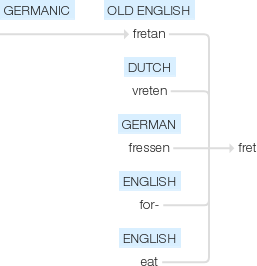Fret
Old English fretan ‘devour, consume’, of Germanic origin; related to Dutch vreten and German fressen, and ultimately to for- and eat.
wiktionary
From Middle English frēten(“to eat; to devour, eat up; to bite, chew; to consume, corrode, destroy; to rub, scrape away; to hurt, sting; to trouble, vex”), from Old English fretan(“to eat up, devour; to fret; to break, burst”), [1] from Proto-Germanic *fraetaną(“to consume, devour, eat up”), from Proto-Germanic *fra-(“for-, prefix meaning ‘completely, fully’”) (from Proto-Indo-European *pro-(“forward, toward”)) + *etaną(“to eat”) (ultimately from Proto-Indo-European *h₁ed-(“to eat”)).
The word is cognate with Dutch vreten, fretten(“to devour, hog, wolf”), Low German freten(“to eat up”), German fressen(“to devour, gobble up, guzzle”), Gothic 𐍆𐍂𐌰𐌹𐍄𐌰𐌽( fraitan, “to devour”), Swedish fräta(“to eat away, corrode, fret”); and also related to Danish fråse(“to gorge”).
The senses meaning “to chafe, rub” could also be due to sound-association with Anglo-Norman *freiter (modern dialectalFrench fretter), from Vulgar Latin *frictāre, frequentative of Latin fricāre, from fricō(“to chafe, rub”), ultimately from Proto-Indo-European *bʰreyH-(“to cut”); compare Old French froter (modern French frotter). The chief difficulty is the lack of evidence of the Old French word. [2]
From Middle English frēten(“to adorn, decorate, ornament”), from Old French freté, [3] freter, fretter(“to fret (decorate with an interlacing pattern)”), from Old French fret (from fraindre(“to break”), from Latin frangō(“to break, shatter”), ultimately from Proto-Indo-European *bʰreg-(“to break”)) + Old French -er(“suffix forming verbs”) (from Latin -āre, ultimately from Proto-Indo-European *h₃enh₂-(“to burden, charge”)).
From Old French frete(“ferrule, ring”) (modern French frette). The origin of the music senses are uncertain; they are possibly from frete or from fret (“to chafe, rub”). [4]
From Latin fretum(“channel, strait”).
From Old French frete, fraite, fraicte, possibly partly confused with fret(“channel, strait”). [5]
Attested since the mid-1800s, of unknown origin. [6] Perhaps related to fret(“to form a pattern upon”), [7] fret(“to consume”) (as the fog does the land), or fret(“to agitate the surface of water”) (as the wind which blows the fog inland does); compare the semantics of haar(“cold wind; misty wind; fog, mist”). Dialectally, the spelling freet and pronunciation /fɹit/ are also found, as they also are for fret(“consume; agitate”). [8]
etymonline
fret (v.)
Old English fretan "devour, feed upon, consume," from Proto-Germanic compound *fra-etan "to eat up," from *fra- "completely" (from PIE root *per- (1) "forward," hence "through") + *etan "to eat" (from PIE root *ed- "to eat"). Cognates include Dutch vreten, Old High German frezzan, German fressen, Gothic fraitan.
Used of monsters and Vikings; in Middle English used of animals' eating. Notion of "wear away by rubbing or scraping" (c. 1200) might have come to this word by sound-association with Anglo-French forms of Old French froter "to rub, wipe; beat, thrash," which is from Latin fricare "to rub" (see friction). Figurative use is from c. 1200, of emotions, sins, vices, etc., "to worry, consume, vex" someone or someone's heart or mind, from either the "eating" or the "rubbing" sense. Intransitive sense "be worried, vex oneself" is by 1550s. Modern German still distinguishes essen for humans and fressen for animals. Related: Fretted; fretting. As a noun, early 15c., "a gnawing," also "the wearing effect" of awareness of wrongdoing, fear, etc.
fret (n.1)
"ornamental interlaced pattern," late 14c., from Old French frete "interlaced work, trellis work," probably from Frankish *fetur or another Germanic source (cognates: Old English fetor, Old High German feggara "a fetter, shackle") perhaps from the notion of "decorative anklet," or of materials "bound" together.
fret (n.2)
"ridge on the fingerboard of a guitar," c. 1500, of unknown origin, possibly from another sense of Old French frete "ring, ferule." Compare Middle English fret "a tie or lace" (early 14c.), freten (v.) "to bind, fasten" (mid-14c.).
